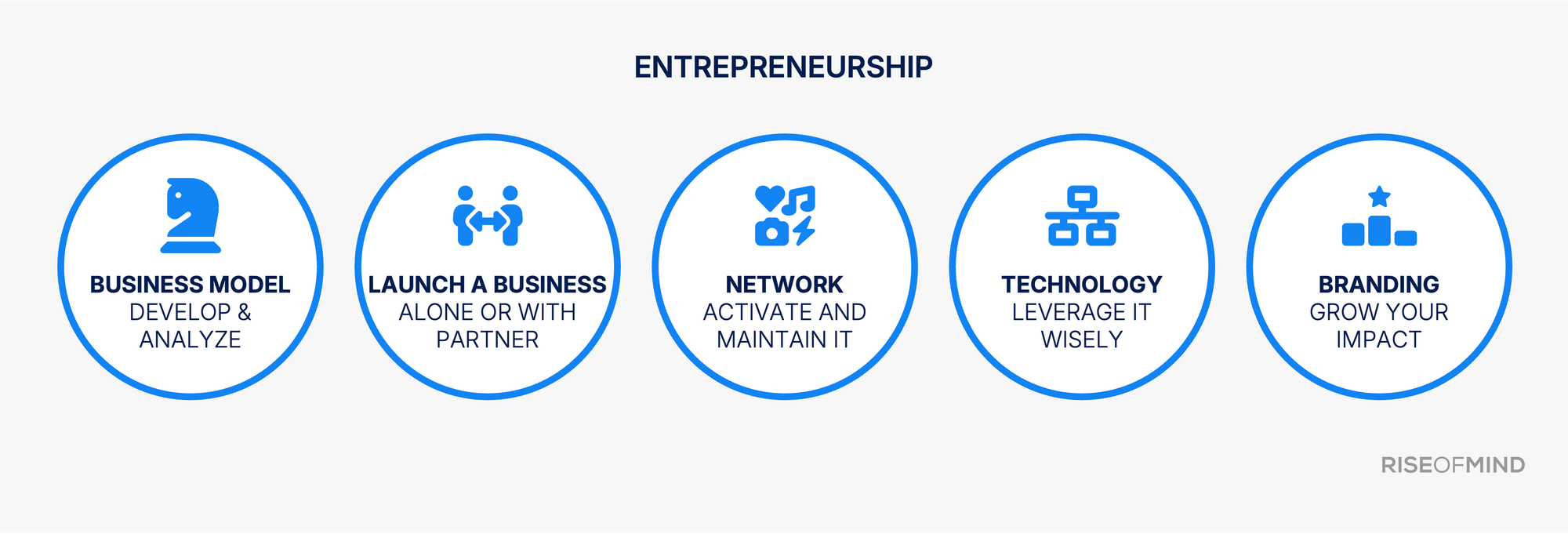Outside your comfort zone lie new opportunities for growth and self-fulfillment.
Taking the leap into self-employment requires courage, but it can lead to a more fulfilling and self-directed professional life.
Many people remain stuck in rigid job structures for years, with little room for creativity or personal growth. Yet entrepreneurship offers more: responsibility, flexibility, creative freedom, and the chance to shape your work on your own terms.
But despite all its potential, the leap into entrepreneurship is no guarantee for success.
Why so many startups fail and how you can do better
A large number of startups fail within the first few years, not due to a lack of ideas, but because of poor preparation, weak structures, or insufficient market validation.
That’s exactly where the five pillars outlined in this article come in. They provide a stable foundation, whether you:
- are thinking about self-employment for the first time,
- have already gathered some experience, or
- want to grow and scale your existing business.
The core principles remain the same.
The five pillars of entrepreneurial success

1. Develop and analyze your business model
The first step toward self-employment is to thoroughly evaluate your business model. Start by answering key questions such as:
- What problem does your offer solve?
- Who are your target customers?
- What is the current market situation?
Proven methods like the SWOT analysis (Strengths, Weaknesses, Opportunities, Threats) and PESTEL (macro-environmental factors) help assess your concept realistically. What really matters: Don’t guess what customers might want - collect real data and feedback to create a solid foundation for your business.
2. Structure your business setup from the start
Launching a business can be a smooth process, if you plan ahead and clarify key legal and organizational matters early on, such as:
- Choosing the right legal structure
- Registering your business and sorting out taxes
- Insurance and legal protections
- Clear role distribution if starting with co-founders
If you're launching with partners, it's crucial to align on shared values, goals, and responsibilities - ideally in writing. A well-structured setup ensures legal certainty and helps avoid friction later on.
3. Build and leverage a strategic network
Your network is a valuable asset. It helps attract clients, gain insights from others, and improve your offer continuously.
Focus on:
- Building real relationships, both online and offline
- Communicating clearly what you offer and why it matters
- Being open to feedback and acting on it
- Using platforms like LinkedIn or industry-specific communities purposefully
A well-nurtured network boosts your visibility and creates opportunities that often wouldn’t arise otherwise.
4. Use technology, tools, and processes effectively
In the early stages, many entrepreneurs try to do everything themselves. But long-term efficiency comes from delegating and automating wherever possible. Tools for project management, accounting, email marketing, or CRM can significantly ease your daily workload.
Take time to identify repeatable processes and where technology can save you time. This frees up capacity for what really matters: strategy, customer relationships, and business development.
5. Build a strong brand and position yourself clearly
A consistent and professional brand presence builds trust, regardless of your industry or audience.
Focus on:
- Clear positioning: What do you offer, to whom, and why are you the right choice?
- Professional design across your website and materials
- A consistent tone of voice and communication style
- Strong brand recognition across all touchpoints
Your brand is more than a logo. It reflects the quality, values, and credibility of your work and helps you stand out in the market.
Succeeding with clarity and persistence
Becoming self-employed is a conscious decision to shape your professional life on your own terms. With a solid business model, structured setup, strong network, smart use of technology, and a clear brand, you create the foundation for long-term success.
It’s about taking the next consistent step - over and over again.
Because entrepreneurship isn’t a sprint. It’s a marathon.
Those who stay persistent learn, adapt, and grow - even through setbacks.
What’s next
In the coming months, we’ll explore each of these five success pillars in more depth with actionable tips, practical tools, and examples you can apply to your own journey.
If you want to approach your entrepreneurial path with reflection and structure, stay connected. At RiseOfMind, you’ll find fresh inspiration for your entrepreneurial path - delivered regularly.

